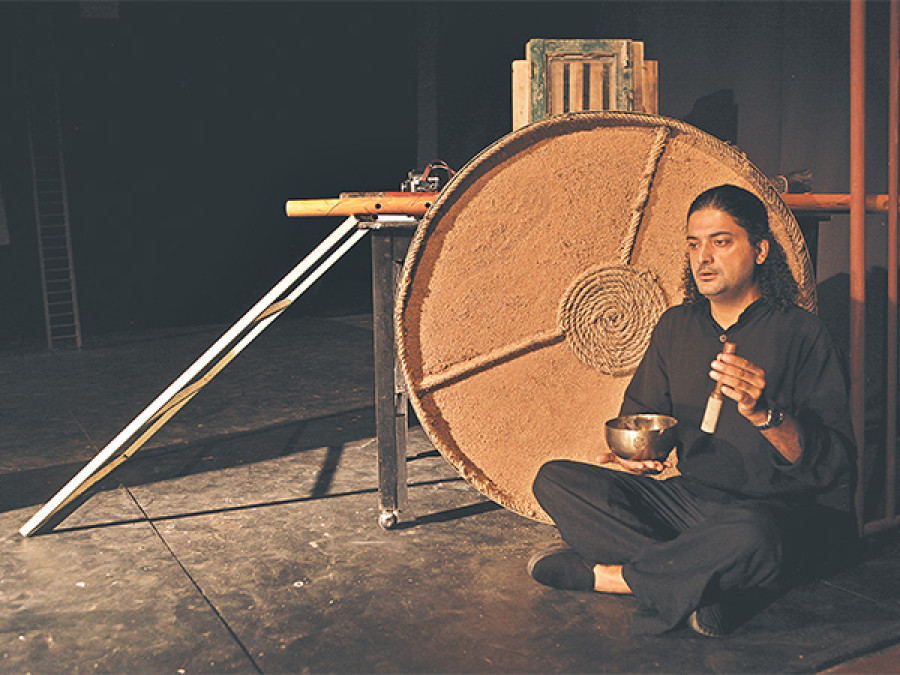Miscellaneous
Chronicling a legend
The first scene opens with motion pictures on the wall, accompanied by noises, narrating the Mahabharata as it appears in BP Koirala’s shortest novel, Modi Aayin. Excerpts from BP’s novels and short stories are staged inthe form of vignettes woven into the play.
Timothy Aryal
Why is former prime minister BP Koirala lionised today, even after three decades of his demise? Why is he often remembered by politicians, regardless of their political leaning? Why are his ideas considered still relevant today? Sandajuko Mahabharat, a play currently being staged at Theatre Village, explores these questions, providing the audience a chance to take a peek into the life of the famous writer-politician.
The play, written by Abhi Subedi and directed by Bimal Subedi,is an observer’s account of the late leader’s life. But while it explores the historical events of BP’s times, it does little to analyse the causeand effects of the events thattranspired.
The first scene opens with motion pictures on the wall, accompanied by noises, narrating the Mahabharata as it appears in BP Koirala’s shortest novel, Modi Aayin. Excerpts from BP’s novels and short stories are staged inthe form of vignettes woven
into the play.
The plot revolves around BP’s works and political life as illustrated by a sutradhar (a single chorus commentator), played by Salil Subedi. “I have made a play out of Sandaju’s life and works,” says the narrator, using BP’s pet name to introduce him to the audience, as he sets the stage for all that’s to follow.As the chorus introduces the works of BP to the audience, silhouettes depicting a war scene undulate in the background. And embellished with instruments like the didgeridoo and the murchunga, the chorus threads the sequences together seamlessly.
The spotlight then shifts to the protagonist, Sandaju, a 63-year-old BP, played by Sanjeev Uprety. He is standing in front of the ‘bourgeoisie rulers’, represented by a panel of judges in court. BP has been summoned to justify the worth of his kranti—the revolution.The judges interrogate BP and he answers their queries articulately. Uprety, as Sandaju, maintains that even-keeled eloquence throughout the play. His histrionics-free delivery,sedate and mesaured, are vital to the portrayal of BP’s character. Uprety had mentioned in an essay published in Kantipur daily recently, that the focus of his presentation was to do justice to BP’s character and ideology, rather than merely striving for verisimilitude in his mimesis. Still one cannot help but think this is how BP must have carried himself.
The characterisation of the judges, however, leans expressionistic: with their hierarchy magnified through their seating arrangements, they look down on Sandaju, as they interrogate him. The court scene is a searing reminder of how the supercilious Panchayat regime ruled Nepal with an ironclad fist.
There’s one line in the play that is as drenched with hope, and now in these trying times, in restrospect, with cynicism: “I am certain that someday in the future, the Nepali people will get a constitution promulgated by directly elected MPs.”
That prophecy has come true, but the vision that BP had of a reconciliatory world is yet to materialise. “Socialism can be summed up as the philosophy under which policies are formulated for the welfare of the villagers,” says Sandaju, reminding us of BP’s ideals, which sadly the centre today seems to have forgotten.
There’s much to hail about the play, Salil Subedi’s performance as the choric commentator, inparticular.But when the play is over, the words that will reverberate in the theatregoer’s mind are this: “Socialism is a policythat grants rights to the impoverished and a philosophy which ensures the wellbeing of thepublic not just on paper, butin reality.”The play will be staged till October 10 every day, except for Wednesdays, at 5: 30 pm.




 17.12°C Kathmandu
17.12°C Kathmandu










